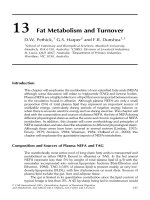The MIT Press Modernity and Technolog phần 10 pptx
Bạn đang xem bản rút gọn của tài liệu. Xem và tải ngay bản đầy đủ của tài liệu tại đây (215.6 KB, 37 trang )
References 385
Giddens, Anthony. 1990. The Consequences of Modernity. Stanford, Calif.:
Stanford University Press.
Giddens, Anthony. 1991. Modernity and Self-Identity: Self and Society in the Late
Modern Age. Cambridge: Polity; Stanford, Calif.: Stanford University Press.
Giddens, Anthony. 1994a. “Living in a Post-Traditional Society,” in U. Beck,
A. Giddens, and S. Lash. Reflexive Modernization: Politics, Tradition and
Aesthetics in the Modern Social Order. Cambridge: Polity; Stanford, Calif.:
Stanford University Press, pp. 56–109.
Giddens, Anthony. 1994b. Beyond Left and Right: The Future of Radical Poli-
tics. Cambridge: Polity.
Gilbert, Alan. 1990. Democratic Individuality. Cambridge: Cambridge Univer-
sity Press.
Gill, Colin. 1985. Work, Unemployment, and the New Technology. Cambridge:
Polity.
Gill, R. 1996. “Power, Social Transformation and the New Determinism: A
Comment on Grint and Woolgar.” Science, Technology & Social Values 21(3):
347–353.
Gill, R., and K. Grint. 1995. “The Gender-Technology Relation: An Introduc-
tion,” in K. Grint and R. Gill, The Gender-Technology Relation: Contemporary
Theory and Research. London: Taylor and Francis, pp. 1–28.
Gilroy, P. 1993. The Black Atlantic: Modernity and Double Consciousness.
London: Verso.
Gitelman, Lisa. 1999. Scripts, Grooves, and Writing Machines: Representing
Technology in the Edison Era. Stanford, Calif.: Stanford University Press.
Gleich, A. von. 1988. “Werkzeugcharakter, Eingriffstiefe und Mitproduktivität
als zentrale Kriterien der Technikbewertung und Technikwahl,” in F. Rauner, ed.
Gestalten: eine neue gesellschaftliche Praxis. Bonn: Verlag Neue Gesellschaft.
Gleich, A. von. 1991. “Über den Umgang mit Natur: Sanfte Chemie als wis-
senschaftliches, chemiepolitisches und regionalwirtschaftliches Konzept.” Wech-
selwirkung 48: 4–12.
Goddard, Stephen B. 1994. Getting There: The Epic Struggle between Road and
Rail in the American Century. New York: Basic Books.
Goldstein, Irwin, and Jennifer Berman. 1998. “Vasculogenic Female Sexual Dys-
function: Vaginal Engorgement and Clitoral Erectile Insufficiency Syndromes.”
International Journal of Impotence Research 10 (suppl.): S84.
Gordon, Deborah. 1988. “Tenacious Assumptions in Western Medicine,” in
M. Lock and D. Gordon, eds. Biomedicine Examined. Boston: D. Riedel,
pp. 165–196.
Graham, Stephen. 1998. “Spaces of Surveillant Simulation: New Technologies,
Digital Representations, and Material Geographies.” Environment and Planning
D: Society and Space 16: 486.
6641 REF UG 9/12/02 5:49 PM Page 385
386 References
Green, K. 1992. “Creating Demand for Biotechnology: Shaping Technologies and
Markets,” in R. Coombs, P. Saviotti, and V. Walsh, eds., Technological Change
and Company Strategies. London: Harcourt Brace Jovanovich, pp. 164–165.
Green, K., and Alan Irwin. 1996. “Clean Technologies,” in P. Groenewegen,
K. Fischer, E. G. Jenkins, and J. Schot, eds. The Greening of Industry: Resource
Guide and Bibliography. Washington D.C.: Island Press, pp. 169–194.
Gregory, Richard. 1981. Mind in Science. Penguin Books.
Grint, Keith, and R. Gill, eds. 1995. The Gender-Technology Relation: Contem-
porary Theory and Research. London: Taylor and Francis.
Grint, Keith, and Steve Woolgar. 1995. “On Some Failures of Nerve in Con-
structivist and Feminist Analyses of Technology.” Science, Technology &
Human Values 20(3): 286–310.
Grint, Keith, and Steve Woolgar. 1997. The Machine at Work. Cambridge: Polity.
Habermas, Jürgen. 1970. “Technology and Science as ‘Ideology’,” in Toward a
Rational Society. Translated by J. Shapiro. Boston: Beacon Press, pp. 62–122.
Habermas, Jürgen. 1983. “Modernity: An Incomplete Project,” in Hal Foster,
ed. The Anti-Aesthetic: Essays on Postmodern Culture. Port Townsend, Wash.:
Bay Press, pp. 3–15.
Habermas, Jürgen. 1984–87. Theory of Communicative Action. Translated by
T. McCarthy. Boston: Beacon Press, 2 vols.
Habermas, Jürgen. 1986. Autonomy and Solidarity: Interviews. P. Dews, ed.
London: Verso.
Habermas, Jürgen. 1987. The Philosophical Discourse of Modernity: Twelve
Lectures. Cambridge, Mass.: MIT Press.
Habermas, Jürgen. 1989. The Structural Transformation of the Public Sphere.
Cambridge, Mass.: MIT Press. Reprinted in 1991.
Habermas, Jürgen. 1996. Between Facts and Norms. Cambridge, Mass.: MIT
Press.
Hacker, Barton C. 1997. “The Weapons of the West: Military Technology and
Modernization in 19th-Century China and Japan,” in T. S. Reynolds and S. H.
Cutcliffe, eds. Technology and the West: A Historical Anthology from Technol-
ogy and Culture. Chicago: University of Chicago Press.
Hafner, Katie, and Matthew Lyon. 1996. Where Wizards Stay Up Late: The
Origins of the Internet. New York: Simon and Schuster.
Haggerty, Kevin, and Ericson, Richard. 2000. “The Surveillant Assemblage.”
British Journal of Sociology 54(1): 605–622.
Hajer, Maarten. 1995. The Politics of Environmental Discourse: Ecological
Modernisation and the Policy Process. Oxford: Clarendon.
Hajer, Maarten. 1996. “Ecological Modernization as Cultural Politics,” in
S. Lash, B. Szerszynski, and B. Wynne, eds. Risk, Environment and Modernity:
Towards a New Ecology. London: Sage, pp. 246–268.
6641 REF UG 9/12/02 5:49 PM Page 386
References 387
Hall, Stuart. 1980. “Encoding and Decoding,” in S. Hall, D. Hobson, A. Lowe,
and P. Willis, eds. Culture, Media, Language. London: Hutchinson, pp. 128–138.
Hamlin, Christopher. 1998. Public Health and Social Justice in the Age of
Chadwick: Britain, 1800–1854. Cambridge: Cambridge University Press.
Handy, B. 1998. “The Viagra Craze: A Pill to Cure Impotence?” Time 151
(May 4): 50–54.
Hanseth, Ole, and Eric Monteiro. 1998. “Understanding Information Infrastruc-
ture.” University of Oslo, Oslo, Norway. Available at Ͻwww.ifi.uio.no/~oleha/
Publications/bok.htmlϾ.
Hapnes, T., and K. H. Sørensen. 1995. “Competition and Collaboration in
Male Shaping of Computing,” in K. Grint and R. Gill, eds. The Gender–
Technology Relation: Contemporary Theory and Research. London: Taylor and
Francis, pp. 174–191.
Haraway, Donna. 1991. Simians, Cyborgs and Women. London: Routledge.
Hård, Mikael. 1994. Machines are Frozen Spirit: The Scientification of Refriger-
ation and Brewing in the 19th Century—A Weberian Interpretation. Boulder,
Col.: Westview; Frankfurt/Main: Campus Verlag.
Hård, Mikael. 1998. “German Regulation: The Integration of Modern Technol-
ogy into National Culture,” in M. Hård and A. Jamison, eds. The Intellectual
Appropriation of Technology: Discourses on Modernity, 1900–1939. Cam-
bridge, Mass.: MIT Press, pp. 33–67.
Hård, Mikael, and Andrew Jamison, eds. 1998. The Intellectual Appropriation
of Technology: Discourses on Modernity, 1900–1939. Cambridge, Mass.: MIT
Press.
Harding, Sandra. 1996. “Standpoint Epistemology (a Feminist Version): How
Social Advantage Creates Epistemic Advantage,” in Stephen B. Turner, ed.,
Social Theory and Sociology. Oxford: Blackwell, pp. 146–160.
Harding, Susan. 2000. The Book of Jerry Falwell. Princeton, N.J.: Princeton
University Press.
Harootunian, Harry. 2000a. History’s Disquiet: Modernity, Cultural Practice,
and the Question of Everyday Life. New York: Columbia University Press.
Harootunian, Harry. 2000b. Overcome by Modernity: History, Culture, and
Community in Interwar Japan. Princeton, N.J.: Princeton University Press.
Harre, R. 1979. Social Being. Oxford: Blackwell.
Hartsock, Nancy. 1987. “Rethinking Modernism: Minority vs. Majority Theo-
ries.” Cultural Critique 14: 15–33.
Harvey, David. 1989. The Condition of Postmodernity: An Enquiry into the
Origins of Cultural Change. Cambridge: Blackwell.
Hatzichristou, D. G. 1998. “Current Treatment and Future Perspectives for
Erectile Dysfunction.” International Journal of Impotence Research 10
(suppl.1): S3–13.
6641 REF UG 9/12/02 5:49 PM Page 387
388 References
Hauben, Michael, and Ronda Hauben. 1997. Netizens: On the History and Im-
pact of Usenet and the Internet. Los Alamitos, Calif.: IEEE Computer Society
Press.
Hauben, Ronda. 1996. The Netizens’ Netbook. Available at Ͻwww.columbia.
edu/~hauben/netbook/Ͼ
Hausman, B. L. 1995. Changing Sex: Transsexualism, Technology and the Idea
of Gender. Durham, N.C.: Duke University Press.
Hawkes, Gail. 1996. A Sociology of Sex and Sexuality. Buckingham, UK: Open
University Press.
Hay, Stephen T. 1970. Asian Ideas of East and West: Tagore and His Critics in
Japan, China, and India. Cambridge, Mass.: Harvard University Press.
Hecht, Gabrielle. 1998. The Radiance of France: Nuclear Power and National
Identity after World War II. Cambridge, Mass.: MIT Press.
Heidegger, Martin. 1977. “The Question Concerning Technology,” in D. Krell,
ed., Basic Writings. New York: Harper & Row, pp. 283–318.
Heidegger, Martin. 1998. “Traditional Language and Technological Language.”
Journal of Philosophical Research 23: 129–145 (translated by Wanda Torres
Gregory).
Held, David, Anthony McGrew, David Goldblatt, and Jonathan Perraton. 1999.
Global Transformations: Politics, Economics and Culture. Stanford, Calif.:
Stanford University Press.
Hennessy, R. 1993. Materialist Feminism and the Politics of Discourse. London:
Routledge.
Herf, Jeffrey. 1984. Reactionary Modernism: Technology, Culture and Politics
in Weimar and the Third Reich. Cambridge: Cambridge University Press.
Herken, Gregg. 1983. Counsels of War. New York: Knopf.
Hess, David. 1991. Spirits and Scientists. University Park: Pennsylvania State
University Press.
Hess, David. 1993. Science in the New Age. Madison: University of Wisconsin
Press.
Hess, David. 1997. Can Bacteria Cause Cancer? New York: New York Univer-
sity Press.
Hess, David. 1999. Evaluating Alternative Cancer Therapies. New Brunswick,
N.J.: Rutgers University Press.
Higgs, Eric, Andrew Light, and David Strong, eds. 2000. Technology and the
Good Life? Chicago: University of Chicago Press.
Hitt, J. 2000. “The Second Sexual Revolution.” New York Times Magazine
(February 18): 34–41, 50, 62, 64, 68–69.
Hobsbawm, Eric J. 1952. “The Machine Breakers.” Past and Present 1: 57–70.
Hobsbawm, Eric J., and George Rudé. 1969. Captain Swing. London: Lawrence
and Wishart.
6641 REF UG 9/12/02 5:49 PM Page 388
References 389
Hobday, Michael. 1995. Innovation in East Asia: The Challenge to Japan.
Aldershot, UK/Brookfield, Vt.: Edward Elgar.
Hoogma, Remco, Rene Kemp, Johan Schot, and Benhard Truffer. 2002. Experi-
menting for Sustainable Transport: The Approach of Strategic Niche Manage-
ment. London: E&FN Spon.
Horkheimer, Max, and Theodor Adorno. 1972. Dialectic of Enlightenment.
New York: Seabury.
Hughes, Thomas P. 1983. Networks of Power: Electrification in Western Soci-
ety, 1880–1930. Baltimore, Md.: Johns Hopkins University Press.
Hughes, Thomas P. 1987. “The Evolution of Large Technological Systems,” in
W. Bijker, T. Pinch, and T. Hughes, eds. The Social Construction of Technologi-
cal Systems: New Directions in the Sociology and History of Technology.
Cambridge, Mass.: MIT Press, pp. 51–82.
Hughes, Thomas P. 1989. American Genesis. New York: Viking.
Hughes, Thomas P. 1998. Rescuing Prometheus. New York: Pantheon.
Hunt, Lynn, ed. 1993. The Invention of Pornography: Obscenity and the Ori-
gins of Modernity, 1500–1800. New York: Zone Books.
Ihde, Don. 1990. Technology and the Lifeworld. Bloomington, Ind.: Indiana
University Press.
Ihde, Don. 1993. Postphenomenology. Evanston, Ill.: Northwestern University
Press.
Ihde, Don. 1999. “Technology and Prognostic Predicaments.” AI and Society
13: 44–51.
Iliffe, Rob. 2000. “The Masculine Birth of Time: Temporal Frameworks of
Early Modern Natural Philosophy.” British Journal of the History of Science
33: 427–453.
Irwin, A. 1995. Citizen Science. London/New York: Routledge.
Irwin, A., and B. Wynne, eds. 1996. Misunderstanding Science: The Public Recon-
struction of Science and Technology. Cambridge: Cambridge University Press.
Jackson, S. 1999. “Feminist Sociology and Sociological Feminism: Recovering
the Social in Feminist Thought.” Sociological Research Online 4(3): Available at
Ͻwww.socresonline.org.uk/socresonline/4/3/jackson.htmlϾ
Jackson, S., and S. Scott. 1997. “Gut Reactions to Matters of the Heart: Reflec-
tions on Rationality, Irrationality and Sexuality.” Sociological Review 45(4):
551–575.
Jahn, B. 1998. “One Step Forward, Two Steps Back: Critical Theory as the Lat-
est Edition of Liberal Idealism.” Millennium: Journal of International Studies
27(3): 613–641.
James, C. L. R. 2001. The Black Jacobins. Harmondsworth, UK: Penguin.
Jameson, Frederick. 1991. Postmodernism, or the Cultural Logic of Late Capi-
talism. London: Verso.
6641 REF UG 9/12/02 5:49 PM Page 389
390 References
Jamison, Andrew, Ron Eyerman, Jacqueline Cramer, with Jeppe Laessøe. 1990.
The Making of the New Environmental Consciousness. Edinburgh: Edinburgh
University Press.
Jänicke, M. 1993. “Über ökologische und politische Modernisierungen.”
Zeitschrift für Umweltpolitik und Umweltrecht 2: 159–175.
Jasanoff, Sheila, Gerald Markle, James Petersen, and Trevor Pinch, eds. 1995.
Handbook of Science and Technology Studies. London: Sage.
Johnson, Allen, and Timothy Earle. 1987. The Evolution of Human Societies.
Stanford, Calif.: Stanford University Press.
Jørgensen, Ulrik, and Peter Karnøe. 1995. “The Danish Wind-Turbine Story:
Technical Solutions to Political Visions?” in A. Rip, T. J. Misa, and J. Schot,
eds. Managing Technology in Society: The Approach of Constructive Technol-
ogy Assessment. London: Pinter, pp. 57–82.
Kandal, Terry. 1988. The Woman Question in Classical Social Theory. Miami:
Florida International University Press.
Kellner, Douglas. 2000. “Crossing the Postmodern Divide with Borgmann, or
Adventures in Cyberspace,” in E. Higgs, A. Light, and D. Strong, eds. Technol-
ogy and the Good Life? Chicago: University of Chicago Press, pp. 234–255.
Kellner, Douglas. 2001. “Feenberg’s Questioning Technology.” Theory, Culture
and Society 18(1): 155–162.
Kemp, René, Arie Rip, and Johan Schot. 2001. “Constructing Transition Paths
Through the Management of Niches,” in R. Garud and P. Karnøe, eds., Path De-
pendence and Creation. Mahwah, N.J.: Lawrence Erlbaum Associates pp. 269–299.
Kern, Stephen. 1983. The Culture of Time and Space, 1880–1918. Cambridge,
Mass.: Harvard University Press.
Khan, Haider A. 1996. “Beyond Distributive Justice in the McWorld.” Paper
presented at the Democratization Conference, Denver, Colorado.
Khan, Haider A. 1997. Technology, Energy and Development. Cheltenham,
UK: Edward Elgar.
Khan, Haider A. 1998. Technology, Development and Democracy: Limits of
National Innovation Systems in the Age of Postmodernism. Cheltenham, UK:
Edward Elgar.
Kinsey, Alfred C., and the staff of the Institute for Sex Research. 1953. Sexual
Behavior in the Human Female. Philadelphia: Saunders.
Kline, Ronald R. 2000. Consumers in the Country: Technology and Social
Change in Rural America. Baltimore, Md.: Johns Hopkins University Press.
Kline, Ronald, and Trevor Pinch. 1996. “Users as Agents of Technological
Change: The Social Construction of the Automobile in the Rural United States.”
Technology and Culture 37: 763–795.
Kraybill, Donald B., and Marc Alan Olshan. 1994. The Amish Struggle with
Modernity. Hanover, N.H.: University Press of New England.
6641 REF UG 9/12/02 5:49 PM Page 390
References 391
Kuhn, Thomas. 1962. The Structure of Scientific Revolutions. Chicago: Univer-
sity of Chicago Press. Second edition 1970.
Kumssa, Asfaw, and Haider Khan, eds. 1996. Transnational Economics and Re-
gional Economic Development Strategies: Lessons from Five Low-income De-
veloping Countries. Nagoya, Japan: United Nations Centre for Regional
Development.
La Porte, Todd R. 1988. “The United States Air Traffic System: Increasing Relia-
bility in the Midst of Rapid Growth,” in R. Mayntz and T. P. Hughes, eds. The
Development of Large Technical Systems. Boulder, Col.: Westview, pp. 215–244.
La Porte, Todd R., ed. 1991. Social Responses to Large Technical Systems: Con-
trol or Adaptation. NATO ASI Series D, Behavioural and Social Sciences, vol. 58.
Boston: Kluwer Academic.
La Porte, Todd R., and Paula M. Consolini. 1991. “Working in Practice but not
in Theory: Theoretical Challenges of ‘High-Reliability’ Organizations.” Journal
of Public Administration Research and Theory 1: 19–47.
Lamm, S., and G. S. Couzens. 1998. The Virility Solution: Everything You Need
to Know About Viagra, the Potency Pill that Can Restore and Enhance Male
Sexuality. New York: Fireside Books/Simon and Schuster.
Landauer, Thomas K. 1995. The Trouble with Computers: Usefulness, Usabil-
ity, and Productivity. Cambridge, Mass.: MIT Press.
Landes, David S. 1983. Revolution in Time: Clocks and the Making of the Mod-
ern World. Cambridge, Mass.: Belknap Press.
Lash, Scott. 1999. Another Modernity: A Different Rationality. Oxford: Blackwell.
Lash, Scott, and Jonathan Friedman, eds. 1993. Modernity and Identity.
Oxford: Blackwell.
Lash, Scott, and John Urry. 1994. Economies of Signs and Space. London: Sage.
Lash, Scott, Bronislaw Szerszynski, and Brian Wynne, eds. 1996. Risk, Environ-
ment and Modernity: Towards a New Ecology. London: Sage.
Latour, Bruno. 1984. Les Microbes: Guerre et Paix, suivi de Irréductions. Paris:
A.M. Métailié.
Latour, Bruno. 1987. Science in Action. Cambridge, Mass.: Harvard University
Press.
Latour, Bruno. 1991. Nous n’avons jamais été modernes. Paris: La Découverte.
Latour, Bruno. 1992. “Where are the Missing Masses? The Sociology of a Few
Mundane Artifacts,” in W. Bijker and J. Law, eds. Shaping Technology/Building
Sociotechnical Change. Cambridge, Mass.: MIT Press, pp. 225–258.
Latour, Bruno. 1993. We Have Never Been Modern. Cambridge, Mass.: Harvard
University Press.
Latour, Bruno. 1994. “Les objets ont-ils une histories? Recontre de Pasteur et de
Whitehead dans us bain d’acide lactique,” in I. Stengers, ed. L’Effet Whitehead.
Paris: Vrin.
6641 REF UG 9/12/02 5:49 PM Page 391
392 References
Latour, Bruno. 1999a. Politiques de la nature: Comment faire entrer les sciences
en démocratie. Paris: La Découverte.
Latour, Bruno. 1999b. Pandora’s Hope: Essays on the Reality of Science Stud-
ies. Cambridge, Mass.: Harvard University Press.
Latour, Bruno, and Steve Woolgar. 1979. Laboratory Life: The Social Construc-
tion of Scientific Facts. Princeton, N.J.: Princeton University Press.
Latour, Bruno, and Steve Woolgar. 1986. Laboratory Life: The Construction of
Scientific Facts. London: Sage.
Law, John, ed. 1991. A Sociology of Monsters: Essays on Power, Technology
and Domination. London: Routledge.
Law, John. 1994. Organizing Modernity. Oxford: Blackwell.
Leff, E. 1995. Green Production: Toward an Environmental Rationality. New
York: Guilford.
Lente, Dick van. 1998a. “Machines and the Order of the Harbour: The Debate
About the Introduction of Grain Unloaders in Rotterdam 1905–1907.” Interna-
tional Review of Social History 43: 79–109.
Lente, Dick van. 1998b. “Dutch Conflicts: The Intellectual and Practical Appro-
priation of a Foreign Technology,” in M. Hard and A. Jamison, eds. The Intel-
lectual Appropriation of Technology: Discourses on Modernity, 1900–1939.
Cambridge, Mass.: MIT Press, pp. 189–223.
Lente, Harro van. 1993. Promising Technologies. Delft: Eburon.
Lente, Harro van, and Arie Rip. 1998. “Expectations in Technological Develop-
ments: An Example of Prospective Structures to be Filled in by Agency,” in
C. Disco and B. J. R. van der Meulen, eds. Getting New Technologies Together.
Berlin: Walter de Gruyter, pp. 195–220.
Lerner, Steve. 1997. Eco-Pioneers. Cambridge, Mass.: MIT Press.
Levine, David P. 1997. Self-seeking and the Pursuit of Justice. Aldershot, UK:
Avebury.
Lewis, Tom. 1997. Divided Highways: Building the Interstate Highways, Trans-
forming American Life. New York: Viking.
Lie, Merete, and Knut Sørensen, eds. 1996. Making Technology our Own? Do-
mesticating Technology into Everyday Life. Oslo: Scandinavian University Press.
Light, Andrew. 2000. “Technology, Democracy and Environmentalism: On
Feenberg’s Questioning Technology.” Ends and Means: Journal of the Aberdeen
Centre for Philosophy, Technology and Society 4(2): 7–17.
Linebaugh, Peter. 1992. The London Hanged. Cambridge: Cambridge Univer-
sity Press.
Lipietz, Alain. 1987. Mirages and Miracles: The Crisis of Global Fordism. London:
Verso.
Lovins, Amory B. 1977. Soft Energy Paths: Towards a Durable Peace. New
York: Harper & Row.
6641 REF UG 9/12/02 5:49 PM Page 392
References 393
Lukes, Steven. 1994. “Methodological Individualism Reconsidered,” in M. Martin
and L. McIntyre, eds. Readings in the Philosophy of Social Science. Cambridge,
Mass.: MIT Press, pp. 451–458.
Lundvall, Bengt-Ake. 1992. National Systems of Innovation: Towards a Theory
of Innovation and Interactive Learning. London: Pinter.
Lyon, David. 1988. The Information Society: Issues and Illusions. Cambridge:
Polity; New York: Blackwell.
Lyon, David. 1997a. “Cyberspace Sociality: Controversies over Computer-
Mediated Communication,” in Brian Loader, ed. The Governance of Cyber-
space. London/New York: Routledge, pp. 23–37.
Lyon, David. 1997b. “Bringing Technology Back in: CITs in Social Theories of
Postmodernity,” [in Italian] in Mariella Berra, ed. Ripensare la tecnologia: infor-
matica, informatzione e sviluppo regionale. Torino: Bollati Boringheieri.
Lyon, David. 1999. Postmodernity. Buckingham, UK: Open University Press;
Minneapolis: University of Minnesota Press (2nd ed.).
Lyon, David. 2001. Surveillance Society: Monitoring Everyday Life.
Buckingham, UK: Open University Press.
Lyotard, Jean-François. 1984a. The Postmodern Condition. Minneapolis: Uni-
versity of Minnesota Press.
Lyotard, Jean-François. 1984b. “The Unconscious, History and Phrases: Notes
on The Political Unconscious.” New Orleans Review (Spring): 73–79.
Lyotard, Jean-François. 1988. The Differend: Phrases in Dispute. Translated by
Georges van den Abbeele. Minneapolis: University of Minnesota Press.
Lyotard, Jean-François. 1993. Toward the Postmodern. R. Harvey and
M. Roberts, eds. Atlantic Highlands, N.J.: Humanities Press.
Lyotard, Jean-François, and Jean-Loup Thébaud. 1985. Just Gaming.
Minneapolis: University of Minnesota Press.
MacKenzie, Donald. 1984. “Marx and the Machine.” Technology and Culture
25: 473–502.
MacKenzie, Donald, and Judy Wajcman. 1985. “Introduction: The Social Shap-
ing of Technology,” in Donald MacKenzie and Judy Wajcman, eds. The Social
Shaping of Technology, 1st ed. Buckingham, UK: Open University Press.
MacKenzie, Donald, and Judy Wajcman, eds. 1999. The Social Shaping of
Technology, 2nd ed. Buckingham, UK: Open University Press.
Maines, Rachel P. 1999. The Technology of Orgasm: “Hysteria,” the Vibrator
and Women’s Sexual Satisfaction. Baltimore, Md.: Johns Hopkins University
Press.
Marcuse, Herbert. 1964. One-Dimensional Man. Boston: Beacon Press.
Marquis, Greg. 2000. “The Evolution of Information Technology in Private Se-
curity.” Paper presented at the National Conference on Information Technology
and the Police, Cornwall, Ontario.
6641 REF UG 9/12/02 5:49 PM Page 393
394 References
Marshall, Barbara L. 1994. Engendering Modernity: Feminism, Social Theory,
and Social Change. Boston, Mass.: Northeastern University Press.
Marshall, Barbara L. 2000. Configuring Gender: Explorations in Theory and
Politics. Peterborough, Vt.: Broadview Press.
Marshall, Barbara L. 2002. “Hard Science: Gendered Constructions of Sexual
Dysfunction in the ‘Viagra Age’.” Sexualities 5(2): 131–158.
Martin, Emily. 1994. Flexible Bodies. Boston: Beacon.
Marvin, Carolyn. 1988. When Old Technologies Were New: Thinking about
Electric Communication in the Late Nineteenth Century. New York: Oxford
University Press.
Marx, Gary T. 1988. Undercover: Police Surveillance in America. Berkeley: Uni-
versity of California Press.
Marx, Karl. 1977. Capital. vol. 1. New York: Vintage.
Marx, Leo. 1994. “The Idea of ‘Technology’ and Postmodern Pessimism,” in
M. R. Smith and Leo Marx, eds. Does Technology Drive History? The Dilemma
of Technological Determinism. Cambridge, Mass.: MIT Press, pp. 237–258.
Mascia-Lees, F. E., P. Sharpe, and C. Ballerino-Cohen. 1989. “The Postmod-
ernist Turn in Anthropology: Cautions from a Feminist Perspective.” Signs
15(1): 7–33.
Masters, W. H., and V. E. Johnson. 1966. Human Sexual Response. Boston:
Little, Brown.
Mauron, Alex. 2001. “Is the Genome the Secular Equivalent of the Soul?” Sci-
ence 291: 831–832.
Mayntz, Renate, and Thomas P. Hughes, eds. 1988. The Development of Large
Technical Systems. Boulder, Col.: Westview.
Mayr, Otto. 1986. Authority, Liberty, and Automatic Machinery in Early Mod-
ern Europe. Baltimore, Md.: Johns Hopkins University Press.
McCahill, Mike, and Clive Norris. 1999. “Watching the Workers: Crime,
CCTV, and the Workplace,” in P. Davies, P. Francis, and V. Jupp, eds. Invisible
Crimes: Their Victims and their Regulation. London: Macmillan, pp. 209–210.
McCarthy, Thomas. 1991. Ideals and Illusions: On Reconstruction and Decon-
struction in Contemporary Critical Theory. Cambridge, Mass.: MIT Press.
McGaw, Judith. 1989. “No Passive Victims, No Separate Spheres: A Feminist
Perspective on Technology’s History,” in S. H. Cutcliffe and R. C. Post, eds. In
Context: History and the History of Technology. Bethlehem, Pa.: Lehigh Uni-
versity Press, pp. 172–191.
McKeown, Thomas. 1976. The Modern Rise of Population. New York: Acade-
mic Press.
McKeown, Thomas. 1979. The Role of Medicine. Princeton, N.J.: Princeton
University Press.
McLaren, A. 1999. Twentieth-Century Sexuality: A History. Oxford: Blackwell.
6641 REF UG 9/12/02 5:49 PM Page 394
References 395
Meehan, J., ed. 1995. Feminists Read Habermas. London: Routledge.
Melchiode, G., and B. Sloan. 1999. Beyond Viagra: A Commonsense Guide to
Building a Healthy Sexual Relationship for Both Men and Women. New York:
Owl Books (Henry Holt).
Menser, M., and S. Aronowitz. 1996. “On Cultural Studies, Science and Tech-
nology,” in S. Aronowitz and M. Mesner, eds., Technoscience and Cyberculture.
London: Routledge, pp. 7–28.
Miller, Daniel. 1994. Modernity—An Ethnographic Approach: Dualism and
Mass Consumption in Trinidad. Oxford: Berg.
Miller, Daniel, and Don Slater. 2000. The Internet: An Ethnographic Approach.
London: Berg.
Miller, Daniel, and Don Slater. forthcoming. “Ethnography On and Off Line:
Cybercafes in Trinidad,” in M. Johnson, ed. Internet Ethnographies. Oxford:
Berg (in press 2002).
Mills, C. W. 1959. The Sociological Imagination. New York: Oxford University
Press.
Misa, Thomas J. 1988. “How Machines Make History, and How Historians
(and Others) Help Them to Do So.” Science, Technology & Human Values 13:
308–331.
Misa, Thomas J. 1994. “Retrieving Sociotechnical Change from Technological
Determinism,” in M. R. Smith and Leo Marx, eds. Does Technology Drive His-
tory? The Dilemma of Technological Determinism. Cambridge, Mass.: MIT
Press, pp. 115–141.
Misa, Thomas J. 1995. A Nation of Steel: The Making of Modern America,
1865–1925. Baltimore, Md.: Johns Hopkins University Press.
Mitcham, Carl. 1994. Thinking through Technology: The Path Between Engi-
neering and Philosophy. Chicago: University of Chicago Press.
Mokyr, Joel. 1990. The Lever of Riches. Oxford: Oxford University Press.
Mol, A. P. J. 1995. The Refinement of Production: Ecological Moderni-
sation Theory and the Chemical Industry. Utrecht: Jan van Arkel/International
Books.
Mol, A. P. J. 1996. “Ecological Modernisation and Institutional Reflexivity: En-
vironmental Reform in the Late Modern Age.” Environmental Politics 5(2):
302–323.
Mol, A. P. J. 2000. “The Environmental Movement in an Era of Ecological
Modernisation.” Geoforum 31: 45–56.
Mol, A. P. J., and F. Buttel, eds. 2002. The Environmental State under Pressure.
Oxford: Elsevier.
Mol, A. P. J., and G. Spaargaren. 1993. “Environment, Modernity and the Risk-
Society: The Apocalyptic Horizon of Environmental Reform.” International
Sociology 8(4): 431–459.
6641 REF UG 9/12/02 5:49 PM Page 395
396 References
Mol, A. P. J., and G. Spaargaren. 2000. “Ecological Modernization Theory in
Debate: A Review.” Environmental Politics 9(1): 17–49.
Mom, Gijs, Marc Dierikx, Adrienne van den Bogaard, and Charley Werff. 1999.
Schiphol: Haven, Station, Knooppunt sinds 1916. Zutphen, Netherlands: Walburg.
Monahan, Torin. 2000. “Flexible Spaces and Built Pedagogies: Emerging
IT Embodiments,” Master’s thesis, Science and Technology Studies Department,
Rensselaer Polytechnic Institute, Troy. N.Y.
Moon, Suzanne M. 1998. “Takeoff or Self-Sufficiency? Ideologies of Develop-
ment in Indonesia, 1957–1961.” Technology and Culture 39: 187–212.
Morales, A. 1998. Erectile Dysfunction: Issues in Current Pharmacotherapy.
London: Martin Dunitz, pp. xv–xvi.
Morgan, Gareth. 1983. “Research Strategies: Modes of Engagement,” in
G. Morgan, ed. Beyond Method: Strategies for Social Research. London: Sage,
pp. 19–42.
Morris-Suzuki, Tessa. 1994. The Technological Transformation of Japan: From
the Seventeenth to the Twenty-first Century. Cambridge: Cambridge University
Press.
Morrow, R. A. 1994. Critical Theory and Methodology. Thousand Oaks, Calif:
Sage.
Moss, Ralph. 1996. The Cancer Industry. Brooklyn: Equinox.
Mumford, Lewis. 1934. Technics and Civilization. New York: Harcourt, Brace.
Murata, Junichi. 1999. “Interpretation and Design: the Nature of Technology
and its Interpretive Flexibility.” Paper presented at a seminar at San Diego State
University.
Murray, Janet H. 1997. Hamlet on the Holodeck: The Future of Narrative in
Cyberspace. Cambridge, Mass.: MIT Press.
Nakaoka, Tetsuro. 1999. Jidousha ga hashitta (The cars have run). Tokyo:
Asahi-Shinbunsha.
Nelkin, Dorothy, ed. 1979. Controversy: Politics of Technical Decisions. Beverly
Hills, Calif.: Sage.
Nelson, Richard R., and Nathan Rosenberg, eds. 1993. National Innovation
Systems: A Comparative Analysis. New York/Oxford: Oxford University Press.
Nicholson, Linda. 1994. “Interpreting Gender.” Signs 20(1): 79–105.
Nishida, Kitaro. 1949a. Complete Works. vol. 8. Tokyo: Iwanami.
Nishida, Kitaro. 1949b. Complete Works. vol. 9. Tokyo: Iwanami.
Nishida, Kitaro. 1950. Complete Works. vol. 12. Tokyo: Iwanami.
Noble, David. 1984. Forces of Production: A Social History of Industrial Au-
tomation. New York: Knopf.
Nolan, Mary. 1994. Visions of Modernity: American Business and the Modern-
ization of Germany. New York: Oxford University Press.
6641 REF UG 9/12/02 5:49 PM Page 396
References 397
Norberg, Arthur L., and Judy E. O’Neill. 1996. Transforming Computer Tech-
nology: Information Processing for the Pentagon, 1962–1986. Baltimore, Md.:
Johns Hopkins University Press.
Norman, Donald. 1993. Things that Make Us Smart: Defending Human Attrib-
utes in the Age of the Machine. Reading, Mass.: Addison-Wesley.
Nuvolari, A. 1999. “The ‘Machine Breakers’ and the Industrial Revolution.”
Paper prepared for the European Historical Economics Society Summer School,
Lund, Sweden.
Nye, David E. 1990. Electrifying America: Social Meanings of a New Technol-
ogy, 1880–1940. Cambridge, Mass.: MIT Press.
Nye, David E. 1997. Narratives and Spaces: Technology and the Construction
of American Culture. Exeter, UK: University of Exeter Press.
O’Connor, J. 1998. Natural Causes. Essays in Ecological Marxism. New York/
London: Guilford.
O’Harrow, Robert. 2000. “Firm Tracking Consumers on Web for Drug Com-
panies.” Washington Post (August 14): A25.
Odaka, Konosuke. 1993. Shokuninn no Sekai Koujyou no Sekai (The World of
Factories and the World of Artisans). Tokyo: LibroPort.
Ohkubo, Toshimichi. 1988. “Proposal for ‘Promoting Enterprise and Develop-
ing Products’.” (Ohkubo Toshimichi no Shokusan Kougyou ni kansuru Kenngi.
Modern Thoughts of Japan, vol. 8, The Philosophy of Economics. Tokyo:
Iwanami. First published in 1874.
Oldenziel, Ruth. 1999. Making Technology Masculine: Men, Women and Mod-
ern Machines in America, 1870–1945. Amsterdam: Amsterdam University Press.
Oudshoorn, Nelly, and Trevor Pinch, eds. How Users Matter: The Co-
Construction of Users and Technology (under review at MIT Press).
Overy, Richard. 1990. “Heralds of Modernity: Cars and Planes from Invention
to Necessity,” in Mikulas Teich and Roy Porter, eds. Fin de Siecle and its
Legacy. Cambridge: Cambridge University Press, pp. 54–79.
Paehlke, R. C. 1989. Environmentalism and the Future of Progressive Politics.
New Haven, Conn.: Yale University Press.
Palmer, Richard. 1969. Hermeneutics. Evanston, Ill.: Northwestern University
Press.
Paquiet, P., P. Blancher, and C. Zampa. 1996. Industrie chimique, territoire et so-
ciété: L’environnement comme catalyseur de nouveaux rapports. Lyon/Grenoble:
Economie et Humanisme/IREPD.
Parnis, D. and J. Du Mont. 1999. “Rape Laws and Rape Processing: The Contra-
dictory Nature of Corroboration.” Canadian Woman Studies 19(1 and 2): 74–78.
Parnis, D., and J. Du Mont. 2002. “Examining the Standardized Application of
Rape Kits: An Exploratory Study of Post-Sexual Assault Professional Practices.”
Health Care for Women International (in press).
6641 REF UG 9/12/02 5:49 PM Page 397
398 References
Parry, Jonathan, and Maurice Bloch, eds. 1989. Money and the Morality of Ex-
change. Cambridge: Cambridge University Press.
Parsons, Talcott, and Edward Shils, eds. 1951. Toward a General Theory of Ac-
tion. New York: Harper & Row.
Pavitt, Keith. 1984. “Patterns of Technical Change: Towards a Taxonomy and a
Theory.” Research Policy 13(6): 343–373.
Perrow, Charles. 1984. Normal Accidents: Living with High-Risk Technologies.
New York: Basic Books.
Pickering, Andrew. 1992. Science as Practice and Culture. Chicago: University
of Chicago Press.
Pickering, Andrew. 1995. The Mangle of Practice: Time, Agency and Science.
Chicago: University of Chicago Press.
Pinch, Trevor. 1999. “The Social Construction of Technology: A Review,” in
Robert Fox, ed., Technological Change: Methods and Themes in the History of
Technology. Amsterdam: Harwood, pp. 17–35.
Pinch, Trevor, and Wiebe Bijker. 1986. “Science, Relativism and the New Soci-
ology of Technology: Reply to Russell.” Social Studies of Science 16: 347–360.
Pinch, Trevor, and Wiebe Bijker. 1987. “The Social Construction of Facts and
Artifacts: Or How the Sociology of Science and the Sociology of Technology
Might Benefit Each Other,” in W. Bijker, T. Pinch, and T. Hughes, eds., The So-
cial Construction of Technological Systems: New Directions in the Sociology
and History of Technology. Cambridge, Mass.: MIT Press, pp. 17–50.
Porter, Roy. 2000. The Creation of the Modern World: The Untold Story of the
British Enlightenment. New York: W.W. Norton.
Porter, Theodore M. 1995. Trust in Numbers: The Pursuit of Objectivity in Sci-
ence and Public Life. Princeton, N.J.: Princeton University Press.
Poster, Mark. 1989. Critical Theory and Poststructuralism. Ithaca, N.Y.: Cornell
University Press.
Poster, Mark. 1996. “Databases as Discourse,” in David Lyon and E. Zureik,
eds. Computers, Surveillance, and Privacy. Minneapolis: University of Minnesota
Press, pp. 175–192.
Potts, Annie. 2000. “The Essence of the Hard On: Hegemonic Masculinity and
the Cultural Construction of ‘Erectile Dysfunction’.” Men and Masculinities
3(1): 85–103.
President’s Commission on Critical Infrastructure Protection. 1997. Critical
Foundations: Protecting America’s Infrastructures. Washington, D.C.: U.S.
Government Printing Office.
Price, David. 1995. “Energy and Human Evolution.” Population and Environ-
ment 16(4): 301–319.
Pursell, Carroll. 1993. “The Rise and Fall of the Appropriate Technology Move-
ment in the United States, 1961–1985.” Technology and Culture 34: 629–637.
6641 REF UG 9/12/02 5:49 PM Page 398
References 399
Pursell, Carroll. 1995. The Machine in America: A Social History of Technol-
ogy. Baltimore, Md.: Johns Hopkins University Press.
Rabinbach, Anson. 1990. The Human Motor: Energy, Fatigue, and the Origins
of Modernity. New York: Basic Books.
Radder, Hans. 1996. In and About the World: Philosophical Studies of Science
and Technology. Albany: State University of New York Press.
Randall, Adrian. 1991. Before the Luddites: Custom, Community, and Machin-
ery in the English Woollen Industry, 1776–1809. Cambridge: Cambridge Uni-
versity Press.
Redmond, Kent C., and Thomas M. Smith. 1980. Project Whirlwind: The His-
tory of a Pioneer Computer. Boston: Digital Press.
Reed, Sidney G., Richard H. Van Atta, and Seymour J. Deitchman. 1990.
DARPA Technical Accomplishments: An Historical Review of Selected DARPA
Projects. Alexandria, Va.: Institute for Defense Analyses.
Rheingold, Howard. 1993. The Virtual Community: Homesteading on the Elec-
tronic Frontier. Reading, Mass.: Addison-Wesley.
Rheingold, Howard. 1996. “A Slice of My Life in My Virtual Community,” in
Peter Ludlow, ed. High Noon on the Electronic Frontier: Conceptual Issues in
Cyberspace. Cambridge, Mass.: MIT Press. pp. 413–436.
Richardson, J., ed. 1982. Policy Styles in Western Europe. London: Allen and
Unwin.
Rip, Arie. 1995. “Introduction of New Technology: Making Use of Recent In-
sights from Sociology and Economics of Technology.” Technology Analysis &
Strategic Management 17(4): 417–431.
Rip, Arie, and Rene Kemp. 1998. “Technological Change,” in S. Rayner and
E. L. Malone, eds. Human Choice and Climate Change. vol. II. Columbus,
Ohio: Battelle Press, pp. 327–399.
Rip, Arie, and Barend J. R. van der Meulen. 1996. “The Post-modern Research
System.” Science and Public Policy 23(6): 343–352.
Rip, Arie, Thomas J. Misa, and Johan Schot, eds. 1995. Managing Technology in
Society: The Approach of Constructive Technology Assessment. London: Pinter.
Rival, L., and D. Slater, 1998. “Sex and Sociality: Comparative Ethnography of
Sexual Objectification.” Theory, Culture and Society 15(3–4): 295–322.
Rochlin, G. I. 1997. Trapped in the Net: The Unanticipated Consequences of
Computerization. Princeton, N.J.: Princeton University Press.
Rorty, Richard. 1989. Contingency, Irony, and Solidarity. Cambridge: Cambridge
University Press.
Rose, Mark H. 1995. Cities of Light and Heat: Domesticating Gas and Electric-
ity in Urban America. University Park: Pennsylvania State University Press.
Rose, N. 1996. Inventing Our Selves: Psychology, Power and Personhood.
Cambridge: Cambridge University Press.
6641 REF UG 9/12/02 5:49 PM Page 399
400 References
Rosen, Paul. 1993. “The Social Construction of Mountain Bikes: Technology
and Postmodernity in the Cycle Industry.” Social Studies of Science 23: 479–513.
Rosenband, Leonard N. 2000. Papermaking in Eighteenth-Century France: Man-
agement, Labor, and Revolution at the Montgolfier Mill, 1761–1805. Baltimore,
Md.: Johns Hopkins University Press.
Rosenberg, Nathan. 1970. “Economic Development and the Transfer of Tech-
nology: Some Historical Perspectives.” Technology and Culture 11: 550–575.
Rostow, Walt Whitman. 1960. The Stages of Economic Growth: A Non-
Communist Manifesto. Cambridge: Cambridge University Press.
Rothschild, Joan. 1989. “From Sex to Gender in the History of Technology,” in
S. H. Cutcliffe and R. C. Post, eds. In Context: History and the History of Tech-
nology. Bethlehem, Pa.: Lehigh University Press, pp. 192–203.
Rothschild, Joan, ed. 1999. Feminism and Design. New Brunswick, N.J.: Rutgers
University Press.
Rowland, Wade. 1997. Spirit of the Web: The Age of Information from Tele-
graph to Internet. Toronto: Somerville House.
Ruiter, W. de. 1988. “Het Postmoderne Tijdperk.” Wetenschap en samenleving
40(4): 3–11.
Rule, J. 1986. “Against Innovation? Custom and Resistance in the Workplace,
1700–1850,” in T. Harris, ed. Popular Culture in England, 1500–1850. New
York: St. Martin’s Press, pp. 168–188.
Rule, James. 1973. Private Lives, Public Surveillance. London: Allen Lane.
Rule, James, D. McAdam, T. Stearns, and D. Uglow. 1983. “Documentary
Identification and Mass Surveillance.” Social Problems 32(1): 222–234.
Russell, Stewart. 1986. “The Social Construction of Artefacts: A Response to
Pinch and Bijker.” Social Studies of Science 16: 331–346.
Sabel, Charles F., and Jonathan Zeitlin. 1985. “Historical Alternatives to Mass
Production: Politics, Markets and Technology in Nineteenth-Century Industrial-
ization.” Past & Present 108: 133–176.
Sabel, Charles F., and Jonathan Zeitlin. 1997. “Stories, Strategies, Structures:
Rethinking Historical Alternatives to Mass Production,” in C. F. Sabel and
J. Zeitlin, eds., World of Possibilities: Flexibility and Mass Production in West-
ern Industrialization. Cambridge: Cambridge University Press, pp. 1–33.
Sagan, Scott Douglas. 1993. The Limits of Safety: Organizations, Accidents,
and Nuclear Weapons. Princeton, N.J.: Princeton University Press.
Said, Edward W. 1995. Orientalism: Western Conceptions of the Orient. London:
Penguin. Reprint of the 1978 edition, with a new afterword.
Sale, K. 1995. Rebels Against the Future. Reading, Mass.: Addison-Wesley.
Sayer, A. 1984. Method in Social Science. London: Routledge.
Sayer, A. 2000. “System, Lifeworld and Gender: Associational versus Counter-
factual Thinking.” Sociology 34(4): 707–725.
6641 REF UG 9/12/02 5:49 PM Page 400
References 401
Sayer, Derek. 1991. Capitalism and Modernity: An Excursus on Marx and
Weber. London: Routledge.
Scaff, Lawrence A. 1989. Fleeing the Iron Cage: Culture, Politics, and Moder-
nity in the Thought of Max Weber. Berkeley: University of California Press.
Schatzberg, Eric. 1999. Wings of Wood, Wings of Metal: Culture and Technical
Choice in American Airplane Materials, 1914–1945. Princeton, N.J.: Princeton
University Press.
Schiller, Herbert. 1981. Who Knows: Information in the Age of the Fortune
500. Norwood, N.J.: Ablex.
Schot, Johan. 1991. “Maatschappelijke sturing van technische ontwikkeling:
Constructief technology assessment als hedendaags Luddisme.” Ph.D disserta-
tion, University of Twente, Enschede, Netherlands.
Schot, Johan. 1995. “Schiphol, Kijkdoos van de Moderniteit,” in Vereniging
Milieudefensie, ed. Dossier Schiphol: Over economie en ecologie in Nederland
distributieland. Amsterdam: Vereniging Milieudefensie.
Schot, Johan. 1998. “The Usefulness of Evolutionary Models for Explaining In-
novation: The Case of the Netherlands in the Nineteenth Century.” History and
Technology 14: 173–200.
Schot, Johan. 2001. “Towards New Forms of Participatory Technology Devel-
opment.” Technology Analysis and Strategic Management 13(1): 39–52.
Schot, Johan, and Adri de la Bruhèze. forthcoming. “The Mediated Design of
Products, Consumption and Consumers in the Twentieth Century.” In Nelly
Oudshoorn and Trevor Pinch, eds. How Users Matter: The Co-Construction of
Users and Technology. (under review by MIT Press).
Schot, Johan, and Arie Rip. 1998. “The Past and Future of Constructive Tech-
nology Assessment.” Technological Forecasting and Social Change 54: 251–268.
Schumpter, Joseph. 1950. Capitalism, Socialism, and Democracy. New York:
Harper and Brothers.
Schumpter, Joseph. 1961. The Theory of Economic Development. Oxford: Oxford
University Press.
Schwarz, Michiel, and Michael Thompson. 1990. Divided We Stand: Re-defining
Politics, Technology and Social Choice. New York: Harvester Wheatsheaf.
Sclove, Richard. 1995. Democracy and Technology. New York: Guilford.
Scott, James C. 1998. Seeing Like a State. New Haven, Conn.: Yale University
Press.
Scranton, Philip. 1997. Endless Novelty: Specialty Production and American In-
dustrialization 1865–1925. Princeton, N.J.: Princeton University Press.
Seely, Bruce E. 1987. Building the American Highway System: Engineers as Pol-
icy Makers. Philadelphia: Temple University Press.
Segal, Howard P. 1985. Technological Utopianism in American Culture.
Chicago: University of Chicago Press.
6641 REF UG 9/12/02 5:49 PM Page 401
402 References
Segaller, Stephen. 1998. Nerds 2.0.1: A Brief History of the Internet. New York:
TV Books.
Seiden, O. J. 1998. Viagra: The Virility Breakthrough. Rocklin, Calif.: Prima.
Sen, Amartya. 1992. Inequality Reexamined. Cambridge, Mass.: Harvard Uni-
versity Press.
Sen, Amartya. 1999. Development as Freedom. New York: Knopf.
Sherwood, John M. 1985. “Engels, Marx, Malthus and the Machine.” Ameri-
can Historical Review 90: 837–865.
Sieferle, R. P. 1984. Fortschrittsfeinde? Opposition gegen Technik und Industrie
von der Romantik bis zur Gegenwart. Munich: Beck Verlag.
Slater, Don. 1997. Consumer Culture and Modernity. Cambridge: Polity.
Slater, Don. 1998. “Trading Sexpics on IRC: Embodiment and Authenticity on
the Internet.” Body and Society 4(4): 91–117.
Slater, Don. 2000a. “Consumption without Scarcity: Exchange and Norma-
tivity in an Internet Setting,” in P. Jackson, M. Lowe, D. Miller, and F.
Mort, eds. Commercial Cultures: Economies, Practices, Spaces. London: Berg,
pp. 123–142.
Slater, Don. 2000b. “Political Discourse and the Politics of Need: Discourses on
the Good Life in Cyberspace,” in L. Bennett and R. Entman, eds. Mediated Poli-
tics. Cambridge: Cambridge University Press, pp. 117–140.
Slaton, Amy. 2001. Reinforced Concrete and the Modernization of American
Building, 1900–1930. Baltimore, Md.: Johns Hopkins University Press.
Slevin, James. 2000. The Internet and Society. Cambridge: Polity.
Smalley, Richard E. 2001. “Of Chemistry, Love, and Nanobots.” Scientific
American 285 (September): 76–77.
Smart, Barry. 2000. “Postmodern Social Theory,” in Bryan Turner, ed. The
Blackwell Companion to Social Theory. Oxford: Blackwell, 2nd ed., chap. 14.
Smith, D. 1974. “Women’s Perspective as a Radical Critique of Sociology.” So-
ciological Inquiry 44: 7–13.
Smith, Dorothy E. 1987. The Everyday World as Problematic: A Feminist Soci-
ology. Milton Keynes, UK: Open University Press.
Smith, Dorothy E. 1990. Texts, Facts, and Feminity: Exploring the Relations of
Ruling. London: Routledge.
Smith, Merritt Roe, and Leo Marx, eds. 1994. Does Technology Drive History?
The Dilemma of Technological Determinism. Cambridge, Mass.: MIT Press.
Smith, Terry. 1993. Making the Modern: Industry, Art, and Design in America.
Chicago: University of Chicago Press.
Smits, Martijntje. 1997. “Langdon Winner: Technologie als Schaduwconstitu-
tie,” in Hans Achterhuis, ed. Van Stoommachine tot Cyborg. Amsterdam:
Ambo, pp. 93–115. Translated into English as “Langdon Winner: Technology
6641 REF UG 9/12/02 5:49 PM Page 402
References 403
as a Shadow Constitution,” in Hans Achterhuis, ed. American Philosophy of
Technology: The Empirical Turn. Bloomington, Ind.: Indiana University Press,
2001, pp. 147–169.
Spaargaren, G. 1997. “The Ecological Modernisation of Production and Con-
sumption: Essays in Environmental Sociology.” Ph.D. disseration. Wageningen
Agricultural University, Wageningen, Netherlands.
Spaargaren, G., and A. P. J. Mol. 1992. “Sociology, Environment and Moder-
nity: Ecological Modernisation as a Theory of Social Change.” Society and Nat-
ural Resources 5: 323–344.
Spinosa, Charles, Fernando Flores, and Hubert Dreyfus. 1997. Disclosing New
Worlds: Entrepreneurship, Democratic Action, and the Cultivation of Solidarity.
Cambridge, Mass.: MIT Press.
Sproull, Lee, and Sara B. Kiesler. 1991. Connections: New Ways of Working in
the Networked Organization. Cambridge, Mass.: MIT Press.
Standage, Tom. 1998. The Victorian Internet: The Remarkable Story of the
Telegraph and the Nineteenth Century’s On-Line Pioneers. New York: Walker.
Star, Susan Leigh, and Karen Ruhleder. 1996. “Steps Toward an Ecology of In-
frastructure: Design and Access for Large Information Spaces.” Information
Systems Research 7: 111–134.
Staudenmaier, John M. 1985. Technology’s Storytellers: Reweaving the Human
Fabric. Cambridge, Mass.: MIT Press.
Staudenmaier, John M. 1989. “The Politics of Successful Technologies,” in
S. H. Cutcliffe and R. C. Post eds. In Context: History and the History of Tech-
nology. Bethlehem, Pa.: Lehigh University Press, pp. 150–171.
Staute, J. 1997. Das Ende der Unternehmenskultur: Firmenalltag im Turbokapi-
talismus. Frankfurt: Campus Verlag.
Sterling, Bruce. 1993. “A Short History of the Internet.” Magazine of Fantasy
and Science Fiction (February). Available at Ͻgopher.well.sf.ca.us:70/00/
Publications/authors/Sterling/fsf/internet.fsfϾ (20 Nov. 2001).
Stone, Allurque Rosanne. 1995. The War of Desire and Technology at the Close
of the Mechanical Age. Cambridge, Mass.: MIT Press.
Strasser, Susan, Charles McGovern, and Matthias Judt, eds. 1998. Getting and
Spending: European and American Consumer Societies in the Twentieth Cen-
tury. Cambridge: Cambridge University Press.
Stratton, Jon. 1997. “Cyberspace and the Globalization of Culture,” in David
Porter, ed. Internet Culture. New York: Routledge, pp. 253–276.
Summerton, Jane, ed. 1994. Changing Large Technical Systems. Boulder, Col.:
Westview.
Suzuki, Jun. 1996. Meiji no Kikaikougyou (Machine Industry in Meiji era).
Kyoto: Minerva Shobou.
Sydie, R. A. 1987. Natural Woman, Cultured Man. Toronto: Methuen.
6641 REF UG 9/12/02 5:49 PM Page 403
404 References
Sydie, R. A. 1994. “Sex and the Sociological Fathers.” Canadian Review of So-
ciology and Anthropology 31(2): 117–138.
Szasz, Thomas, and Marc Hollender. 1956. “The Basic Models of the Doctor-
Patient Relationship.” Archives of Internal Medicine 97: 585–592.
Tainter, Joseph. 1998. The Collapse of Complex Societies. New York: Cambridge
University Press.
Tellegen, E. 1983. Milieubeweging. Utrecht/Antwerpen: Het Spectrum.
Tenner, Edward. 1996. Why Things Bite Back: Technology and the Revenge of
Unintended Consequences. New York: Knopf.
Thompson, E. P. 1963. The Making of the English Working Class. London:
Penguin.
Tichi, Cecelia. 1987. Shifting Gears: Technology, Literature, Culture in Mod-
ernist America. Chapel Hill: University of North Carolina Press.
Tiefer, L. 1996. “The Medicalization of Sexuality: Conceptual, Normative and
Professional Issues.” Annual Review of Sex Research 7: 252–282.
Tobey, Ronald C. 1996. Technology as Freedom: The New Deal and the Elec-
trical Modernization of the Home. Berkeley: University of California Press.
Todd, Edmund N. 2001. “Engineering Politics, Technological Fundamentalism,
and German Power Technology, 1900–1936,” in Michael Thad Allen and
Gabrielle Hecht, eds. Technologies of Power. Cambridge, Mass.: MIT Press,
pp. 145–174.
Toulmin, Stephen. 1990. Cosmopolis: The Hidden Agenda of Modernity. New
York: Free Press.
Touraine, Alain. 1971. The Post-Industrial Society: Tomorrow’s Social History;
Classes, Conflicts and Culture in the Programmed Society. New York:
Wildwood House.
Touraine, Alain. 1995. Critique of Modernity. Oxford/Cambridge: Blackwell.
Trommler, Frank. 1995. “The Avant-Garde and Technology: Toward Techno-
logical Fundamentalism in Turn-of-the-Century Europe.” Science in Context 8:
397–416.
Tsunoyama, Sakae. 1984. Tokei no shakaishi (The Social History of Clocks).
Tokyo: Chuou kouron-Sha.
Tukker, A. 1999. Frames in the Toxicity Controversy: Risk Assessment and Pol-
icy Analysis related to the Dutch Chlorine Debate and Swedish PVC Debate.
Dordrecht: Kluwer.
Turkle, Sherry 1984. The Second Self: Computers and the Human Spirit. New
York: Simon and Schuster.
Turkle, Sherry. 1995. Life on the Screen: Identity in the Age of the Internet.
New York: Simon and Schuster.
Turner, Bryan, ed. 1990. Theories of Modernity and Postmodernity. London:
Sage.
6641 REF UG 9/12/02 5:49 PM Page 404
References 405
Turner, Bryan. 1993. Max Weber: From History to Modernity. London/New
York: Routledge.
Ullrich, O. 1979. Weltniveau: In der Sachgasse der Industriegesellschaft. Berlin:
Rotbuch.
Urometrics. 2000. Press Release: FDA Grants Clearance for EROS-CTD, First
Treatment for Female Sexual Dysfunction (May 3).
Van Atta, Richard H., Sidney G. Reed, and Seymour J. Deitchman. 1991.
DARPA Technical Accomplishments: An Historical Review of Selected DARPA
Projects. Alexandria, Va.: Institute for Defense Analyses (vol. 2 of 3).
Van Creveld, Martin. 1985. Command in War. Cambridge, Mass.: Harvard
University Press.
Van der Ryn, Sim, and Stuart Cowan. 1996. Ecological Design. Washington,
D.C.: Island Press.
Vaughan, Diane. 1996. The Challenger Launch Decision: Risky Technology,
Culture, and Deviance at NASA. Chicago: University of Chicago Press.
Verheul, H., and P. Vergragt. 1995. “Social Experiments in the Development of
Environmental Technology: A Bottom-up Perspective.” Technology Analysis &
Strategic Management 7: 315–326.
Vig, Norman J. 1988. “Technology, Philosophy, and the State,” in Michael E.
Kraft and Norman J. Vig, eds. Technology and Politics. Durham, N.C.: Duke
University Press, pp. 8–32.
Virilio, Paul. 1986. Speed and Politics: An Essay on Dromology. Translated by
M. Polizzotti. New York: Columbia University Press.
Vogel, D. 1986. National Styles of Regulation. Ithaca, N.Y.: Cornell University
Press.
Vries, Jan de, and Ad van der Woude. 1996. The First Modern Economy: Suc-
cess, Failure, and Perseverance of the Dutch Economy, 1500–1815. Cambridge:
Cambridge University Press.
Waarden, F. van. 1995. “Persistence of National Policy Styles: A Study of their
Institutional Foundation,” in B. Unger and F. van Waarden, eds. Convergence
or Diversity: Internationalization and Economic Policy Response. Aldershot,
UK: Avebury, pp. 333–372.
Wagner, Peter. 1994. A Sociology of Modernity: Liberty and Discipline. London:
Routledge.
Wajcman, Judy. 1991. Feminism Confronts Technology. Cambridge: Polity.
Reprinted 1994.
Wajcman, Judy. 2000. “Reflections on Gender and Technology Studies: In what
State is the Art?” Social Studies of Science 30(3): 447–464.
Ward, David, and Olivier Zunz. 1997. The Landscape of Modernity: New York
City, 1900–1940. Baltimore, Md.: Johns Hopkins University Press.
6641 REF UG 9/12/02 5:49 PM Page 405
406 References
Watson, Peggy. 1997. “(Anti)feminism after Communism,” in Ann Oakley and
Juliet Mitchell, eds. Who’s Afraid of Feminism? London: Hamish Hamilton,
pp. 144–161.
Weber, K. M., R. Hoogma, B. Lane, and J. Schot. 1999. Experimenting with
Sustainable Transport Innovation: A Workbook for Strategic Niche Manage-
ment. Enschede.
Weber, Max. 1958. The Protestant Ethic and the Spirit of Capitalism. New
York: Scribner’s. First published in 1905.
Weber, Max. 1978. Economy and Society. Berkeley: University of California
Press.
Webster, Frank. 1995. Theories of the Information Society. London: Routledge.
Wehler, Hans-Ulrich. 1975. Modernisierungstheorie und Geschichte. Gottingen:
Vandenhoeck und Ruprecht.
West, Cornell. 1988. “Marxist Theory and the Specificity of Afro-American Op-
pression,” in C. Nelson and L. Grossberg, eds. Marxism and the Interpretation
of Culture. Chicago: University of Chicago Press, pp. 17–29.
Westrum, Ron. 1991. Technologies and Society. Belmont, Calif.: Wadsworth.
White, Lynn, Jr. 1962. Medieval Technology and Social Change. Oxford: Oxford
University Press.
Whitehead, E. D., and T. Malloy. 1999. Viagra: the Wonder Drug for Peak Per-
formance. New York: Dell Books.
Whitney, Charles. 1986. Francis Bacon and Modernity. New Haven, Conn.:
Yale University Press.
Wingelaar, M., and A. P. J. Mol. 1997. “Industriële en werknemersbelangen,”
in P. Basset and J. Kastje, eds. Groen ondernemen: Werken aan milieu-
innovaties in bedrijven. Amsterdam: Wetenschappelijk Bureau Groen-Links,
pp. 79–100.
Winner, Langdon. 1977. Autonomous Technology: Technics-out-of-Control as
a Theme in Political Thought. Cambridge, Mass.: MIT Press.
Winner, Langdon. 1980. “Do Artifacts Have Politics?” Daedalus 109: 121–136.
Winner, Langdon. 1986. The Whale and the Reactor. Chicago: University of
Chicago Press.
Winner, Langdon. 1993. “On Opening the Black Box and Finding It Empty: So-
cial Constructivism and the Philosophy of Technology.” Science, Technology &
Human Values 18: 362–378.
Winner, Langdon. 2001. “Where Technological Determinism Went,” in S. H.
Cutcliffe and C. Mitcham, eds. Visions of STS: Counterpoints in Science, Tech-
nology, and Society Studies. Albany: State University of New York Press,
pp. 11–17.
Winograd, Terry, and Fernando Flores. 1987. Understanding Computers and
Cognition. Reading, Mass.: Addison-Wesley.
6641 REF UG 9/12/02 5:49 PM Page 406
References 407
Wise, M. Norton, ed. 1995. The Values of Precision. Princeton, N.J.: Princeton
University Press.
Wittgenstein, Ludwig. 1958. Philosophical Investigations. New York: Macmillan.
Witz, Anne. 2000. “Whose Body Matters? Feminist Sociology and the Corpo-
real Turn in Sociology and Feminism.” Body and Society 6(2): 1–24.
Wooddell, Margaret, and David Hess. 1998. Women Confront Cancer. New
York: New York University Press.
Woolgar, Steve. 1991. “The Turn to Technology in Social Studies of Science.”
Science, Technology and Human Values 16: 20–50.
Woolgar, Steve. 1996. “Science and Technology Studies and the Renewal of So-
cial Theory,” in Stephen Turner, ed. Social Theory and Sociology. Oxford:
Blackwell, pp. 235–255.
Woolgar, Steve, and K. Grint. 1996. “A Further Decisive Refutation of the As-
sumption that Political Action Depends on the ‘Truth’ and a Suggestion that We
Need to go Beyond this Level of Debate: A Reply to Rosalind Gill.” Science,
Technology & Human Values 21(3): 354–357.
Wynne, Brian. 1996. “May the Sheep Safely Graze? A Reflexive View of the
Expert-Lay Knowledge Divide,” in Scott Lash, Bronislaw Szerszynski, and Brian
Wynne, eds. Risk, Environment and Modernity: Towards a New Ecology.
London: Sage, pp. 44–83.
Yates, JoAnne. 1989. Control through Communication: The Rise of System in
American Management. Baltimore, Md.: Johns Hopkins University Press.
Young, Iris Marion. 1994. “Gender as Seriality: Thinking about Women as a
Social Collective.” Signs 19(3): 713–738.
Young, Stacey. 1997. Changing the Wor(l)d: Discourse, Politics and the Femi-
nist Movement. London: Routledge.
Ziman, John, ed. 2000. Technological Innovation as an Evolutionary Process.
Cambridge: Cambridge University Press.
Zuboff, Shoshana. 1988. In the Age of the Smart Machine: The Future of Work
and Power. New York: Basic Books.
6641 REF UG 9/12/02 5:49 PM Page 407
6641 REF UG 9/12/02 5:49 PM Page 4086641 FM UG 9/12/02 5:38 PM Page ii
This Page Intentionally Left Blank
Philip Brey is associate professor and vice chair of the department of
philosophy at the University of Twente, Enschede, the Netherlands. He
received his Ph.D. at the University of California, San Diego. He has
published widely in the philosophy of technology, with a special empha-
sis on information and communication technology (ICT). He has been
investigating how ICT artifacts and systems can, through their design
and embedding in a sociotechnical context, come to function as agents
that bring about changes in social and political arrangements and cul-
tural practices, and he has also been studying the ethical dimensions of
such changes.
Paul N. Edwards is associate professor of information at the University
of Michigan, in Ann Arbor, where he chairs the Program on Science,
Technology & Society. His research interests focus on the history, poli-
tics, and culture of information technology. Edwards is author of The
Closed World: Computers and the Politics of Discourse in Cold War
America (MIT Press, 1996) and co-editor, with Clark A. Miller, of
Changing the Atmosphere: Expert Knowledge and Environmental Gov-
ernance (MIT Press, 2001). He is currently completing a book about cli-
mate science and politics since 1950, tentatively titled The World in a
Machine: Computer Models, Data Networks, and Global Atmospheric
Politics.
Andrew Feenberg is professor of philosophy at San Diego State Univer-
sity. He is the author of Alternative Modernity (University of California
Press, 1995), Questioning Technology (Routledge, 1999), and Transform-
ing Technology (Oxford University Press, 2002). Feenberg is currently
About the Authors
6641 ATA UG 9/12/02 5:44 PM Page 409









